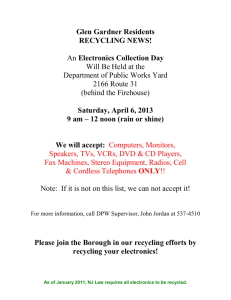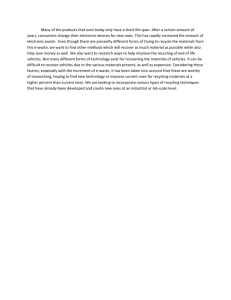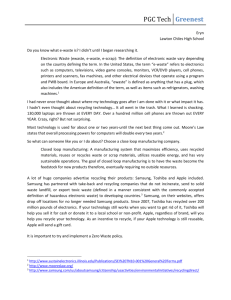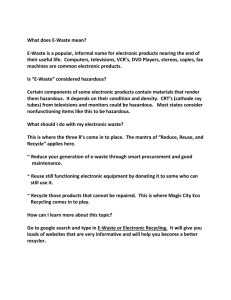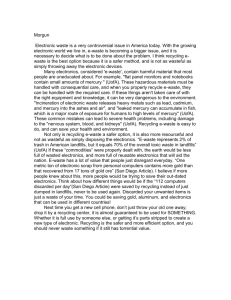ARE YOU BECOMING E-WASTED - Innovative Circuits, Inc.
advertisement
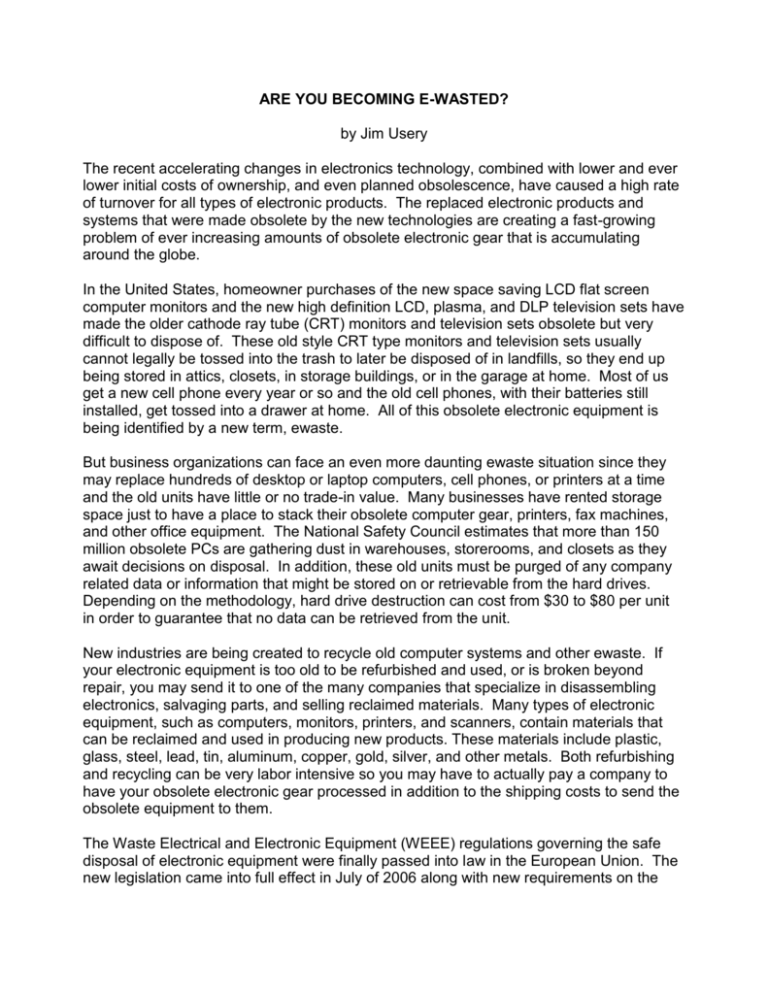
ARE YOU BECOMING E-WASTED? by Jim Usery The recent accelerating changes in electronics technology, combined with lower and ever lower initial costs of ownership, and even planned obsolescence, have caused a high rate of turnover for all types of electronic products. The replaced electronic products and systems that were made obsolete by the new technologies are creating a fast-growing problem of ever increasing amounts of obsolete electronic gear that is accumulating around the globe. In the United States, homeowner purchases of the new space saving LCD flat screen computer monitors and the new high definition LCD, plasma, and DLP television sets have made the older cathode ray tube (CRT) monitors and television sets obsolete but very difficult to dispose of. These old style CRT type monitors and television sets usually cannot legally be tossed into the trash to later be disposed of in landfills, so they end up being stored in attics, closets, in storage buildings, or in the garage at home. Most of us get a new cell phone every year or so and the old cell phones, with their batteries still installed, get tossed into a drawer at home. All of this obsolete electronic equipment is being identified by a new term, ewaste. But business organizations can face an even more daunting ewaste situation since they may replace hundreds of desktop or laptop computers, cell phones, or printers at a time and the old units have little or no trade-in value. Many businesses have rented storage space just to have a place to stack their obsolete computer gear, printers, fax machines, and other office equipment. The National Safety Council estimates that more than 150 million obsolete PCs are gathering dust in warehouses, storerooms, and closets as they await decisions on disposal. In addition, these old units must be purged of any company related data or information that might be stored on or retrievable from the hard drives. Depending on the methodology, hard drive destruction can cost from $30 to $80 per unit in order to guarantee that no data can be retrieved from the unit. New industries are being created to recycle old computer systems and other ewaste. If your electronic equipment is too old to be refurbished and used, or is broken beyond repair, you may send it to one of the many companies that specialize in disassembling electronics, salvaging parts, and selling reclaimed materials. Many types of electronic equipment, such as computers, monitors, printers, and scanners, contain materials that can be reclaimed and used in producing new products. These materials include plastic, glass, steel, lead, tin, aluminum, copper, gold, silver, and other metals. Both refurbishing and recycling can be very labor intensive so you may have to actually pay a company to have your obsolete electronic gear processed in addition to the shipping costs to send the obsolete equipment to them. The Waste Electrical and Electronic Equipment (WEEE) regulations governing the safe disposal of electronic equipment were finally passed into law in the European Union. The new legislation came into full effect in July of 2006 along with new requirements on the Restrictions on Hazardous Substances (RoHS). The new WEEE regulations will place a greater administrative burden on suppliers of electronic equipment to EU countries. Vendors will have to register with waste schemes and more closely track their products in order to pay for those products' eventual disposal. Under the new law, manufacturers selling into the European Union had until March 15, 2005 to register with approved disposal schemes, and by August 13, 2005, all new equipment sold in the European Union was required to be marked with WEEE labels displaying a date code and the standard logo of a crossed-out trash bin. The RoHS directive came into full effect for the European Union on July 1, 2006 with producers taking responsibility for treating and recycling household and business waste electrical and electronic equipment. In the United Kingdom, the dates for WEEE implementation were delayed but are listed below: January 31, 2007: Deadline for compliance schemes to apply for approval February 28, 2007: Deadline for schemes to be approved March 31, 2007: Deadline for producers/schemes to register July of 2007: Full producer responsibility for WEEE begins The WEEE directives for the European Union are setting the stage for future ewaste related debates around the globe, including this year in China, Japan, and South Korea. Similar laws and regulations to the WEEE are being considered now in the United States as Congress debates a number of e-waste management bills. All of these are currently still stalled in committee, but several states have proactively passed their own laws governing e-waste management. California was the first state to enact such legislation (Electronic Waste Recycling Act SB20), followed by Maryland, Maine and Washington. You can research how your state of residence is preparing for e-waste management by going to this website and accessing your state's listings: www.nrc-recycle.org/resources/electronics/policy.htm. This website also provides updates on legislative actions, industry actions, and the latest breaking news on e-waste management. As legislation related to ewaste works its way through our Congress towards Presidential approval, you can expect to see more information being made available on this subject. Information from additional websites is provided below. The two questions and answers below come from the Frequently Asked Questions section of the www.eRecycle.org website: What is "e-waste"? E-waste is a popular, informal name for electronic products nearing the end of their "useful life." Computers, televisions, VCRs, stereos, copiers, and fax machines are common electronic products. Many of these products can be reused, refurbished, or recycled. Unfortunately, electronic discards is one of the fastest growing segments of our nation's waste stream. In addition, some researchers estimate that nearly 75 percent of old electronics are in storage, in part because of the uncertainty of how to manage the materials. Combine this with increasing advances in technology and new products headed towards the market and it is no wonder that "e-waste" is a popular topic. Why should waste electronics be recycled? Most electronic devices contain a variety of materials, including metals, that can be recovered for recycling. Recycling your waste electronics saves resources and protects the Earth because new metals don't have to be mined. In addition, some electronic products contain high enough levels of certain materials, such as lead, that render them hazardous waste when disposed. For instance, California law designates waste televisions and monitors as hazardous. Hazardous wastes cannot be disposed with municipal trash. The Toshiba Corporation has recently announced an enhancement to their recycling plan for laptop computers. The following information is from their website at www.toshibadirect.com: Just as technology continues to advance, so does our collective understanding of the need to protect the environment from hazardous waste. At Toshiba, we are determined to proactively contribute to the establishment of a recycling-based society. For this reason, Toshiba offers free recycling of all Toshiba notebooks as well as low-cost recycling options for other manufacturer laptops and consumer electronics products. Through its trade-in program, Toshiba also provides customers the opportunity to extend the life of their laptop or other consumer electronic product by trading it in for its cash value. Toshiba Trade-In & Recycling Program The Toshiba trade-in and recycling program allows you to trade-in the old technology products you have for the new cutting-edge Toshiba computer technology you want! Regardless of the brand, trade-in used consumer electronic products that still have a monetary value for a refund by mail. If the product is no longer functioning or has no trade-in value, it can be responsibly recycled for the cost of shipping. Recycling of all Toshiba notebooks is free! Whether your pocket book gets a little thicker or landfills get a little leaner, with the Toshiba Trade-in and Recycling Program, everyone wins. At Innovative Circuits Inc., we work with customers from a variety of industries and are involved in many new electronic product introductions, from assisting with the electronics and printed circuit board designs to assembling prototyping units to initial production to full volume production. Visit our website at www.icimfg.com for more information about Innovative Circuits Inc. and the services and expertise that we provide to our customers. You can access our Tech Library page for free access to additional technical articles. You can also sign up for our free Ezine, "PCB Information", at the bottom of the Home Page. Jim Usery Sales and Marketing Director Innovative Circuits, Inc. 311A S Parkway St Corinth, MS 38834 office 662-287-2007 toll free 866-887-7381 fax 662-665-9275 email jusery@icimfg.com
